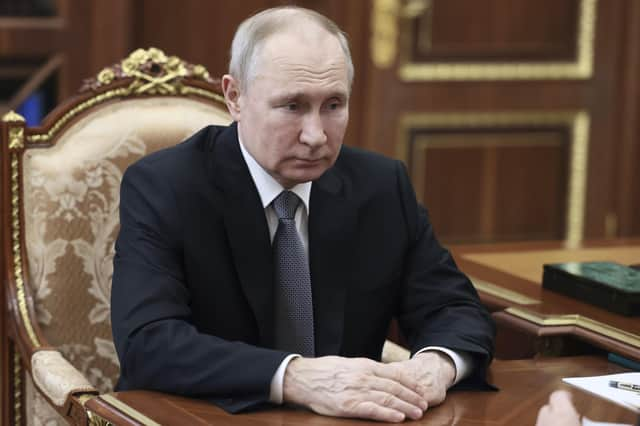Ian Ellis: Amidst the Russian war on Ukraine, German bishop reflects on the fraught topic of what makes a just war


He focused on the theme of a just peace and military action in light of the war of aggression against Ukraine.
Of course, wars are raging in different parts of the world and yet in our western society there is a particular awareness of the situation in Ukraine. Dr Bedford-Strohm explained this reality by saying that the Russian aggression had “shaken our decades-old sense of security so deeply”, and by pointing to the flight westwards of so many refugees from Ukraine.
Advertisement
Hide AdAdvertisement
Hide AdWhile he expressed concern that for the most part only possible military solutions to Vladimir Putin's war in Ukraine were being discussed, the bishop asked if “an autocrat who lives in his own world, misleads his people with all available propagandistic means, and on this basis wages an unscrupulous war of aggression in violation of international law” could be allowed to get what he wanted, suggesting that the likelihood of being able to stop him by non-violent resistance alone is “close to zero”.
Dr Bedford-Strohm preferred to think in terms of “just peace” rather than “just war”, but pointed out that, terrible though war always is, there can also be situations where the renunciation of such force is even more terrible.
The Ukraine horror was also a subject that featured highly at last month's assembly of the Conference of European Churches (CEC), of which the Church of Ireland and the Presbyterian and Methodist Churches in Ireland are full members. The assembly was held in the Estonian capital, Tallinn, just over 600 miles from Moscow.
It issued an unequivocal statement on the Ukrainian situation: “The illegal and brutal invasion of Ukraine by the Russian Federation is condemned without reservation. There is no pretext upon which the invasion of an independent country can be justified – politically, legally or morally. CEC stands with the people of Ukraine as they seek to protect their own people and territory. Its territorial integrity must be recognised globally.
Advertisement
Hide AdAdvertisement
Hide Ad“The assembly has heard powerful stories of injustice and suffering. We pray together for and with those who suffer from the impacts of this war. We mourn the countless loss of life of women, men, young and old. We mourn the wounds, pain and trauma inflicted. We mourn with those forced to flee their homes and loved ones. We 'weep with those who weep' (Romans 12:15-18).”
The statement was also clear that any threat of using nuclear weapons is to be condemned, along with human rights abuses, adding: “Those who launched this war, who propagandise with lies and misinformation, who celebrate violence and domination must be held to account.”
Yulia Kominko, editor-in-chief of the media of the Ukrainian Orthodox Church, reflected that, even amid war, one aspires to be human. “But now, after a year, I can say it is very difficult to maintain your humanity during a full-scale war,” she said.
The Rev. Dr Grzegorz Giemza, from the Council of Churches in Poland, introduced the current project 'Reconciliation between churches in Europe', an initiative which originated in the Polish-German reconciliation process following World War II and which from 1997 also included Ukraine and Belarus.
Advertisement
Hide AdAdvertisement
Hide AdHe said: “Right now, it is impossible to talk about reconciliation in this group, but we need to prepare for the time after the war, and we stay in contact.”
Indeed, looking ahead to the end of the war and what is to come after it is important. There have been two international Ukraine Recovery Conferences. The first was held last year in Lugano, Switzerland, and laid the foundation for Ukraine’s reconstruction process.
The second was held from June 21st-22nd in London and, according to a UK government statement, was focused on work “to unlock the potential of the private sector to help Ukraine’s economic recovery, so that the country comes back stronger, as a modern, stable and resilient democracy”.
Yet beyond the economic reconstruction of Ukraine will be the issue of reconciliation.
Advertisement
Hide AdAdvertisement
Hide AdFrom our own experience arising from the Troubles in Northern Ireland, we know that reconciliation involves hard work, involves small steps as well as the grander gestures, and requires time.
Yet where there has been hostility, reconciliation is always essential, just as it was globally in 1945.
In fact, St Paul wrote that Christian people are called to “the ministry of reconciliation”.
In the aftermath of World War II, as one of many reconciliation initiatives, the UK and Germany set up a conference for teachers in both countries. My parents attended the gathering in the Harz Mountains in northern Germany and made life-long friends there.
Advertisement
Hide AdAdvertisement
Hide AdIndeed, out of that friendship and family exchange visits, I too made life-long friends with them and their extended family's next generation, one of whom, like me, was ordained.
Then again, speaking to this newspaper on a recent visit to Northern Ireland (News Letter, June 24), Rwandan reconciliation leader Christophe Mbonyingabo stressed the importance of perpetrators acknowledging and condemning their past crimes, rather than trying to justify them, as the best way to achieve reconciliation.
There is a timely message for Northern Ireland in that message.
• Canon Ian Ellis is a former editor of The Church of Ireland Gazette